Politics
Afghanistan seeks Indian investments, goods as Taliban minister lands in New Delhi
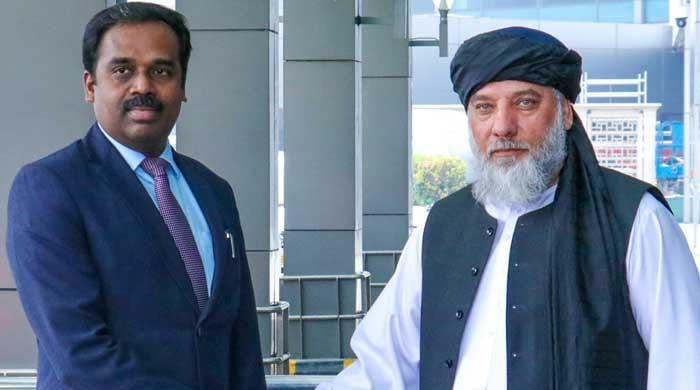
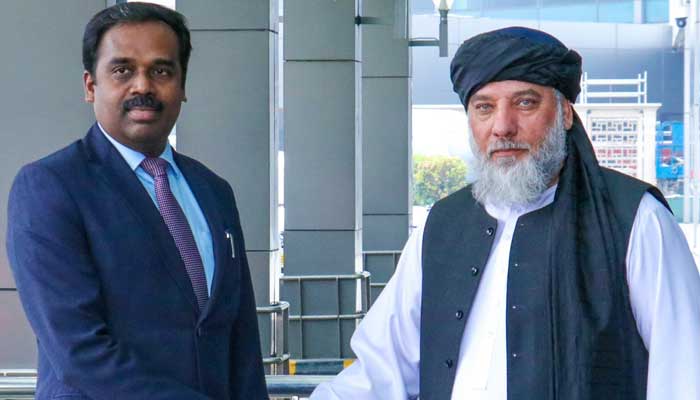
KABUL/NEW DELHI: Afghanistan’s Taliban trade minister arrived in India on Wednesday on a maiden visit to draw greater investments and goods as both countries consider ways to enhance their relations in the backdrop of souring ties with neighbouring Pakistan.
India last month upgraded its ties with the Taliban by reopening its embassy in Kabul that was shut after the group seized power in 2021 following the withdrawal of US-led NATO forces. New Delhi is also ramping up its aid to the country as it competes with China for influence.
Minister Alhaj Nooruddin Azizi will hold talks with his Indian counterpart and the foreign minister, as well as with traders and investors, Afghanistan’s commerce ministry said in a statement.
“These meetings will focus on expanding economic cooperation, facilitating trade relations, creating joint investment opportunities, and strengthening Afghanistan’s role in regional transit routes,” it added.
Landlocked Afghanistan is seeking access to grains, medicines and industrial goods following the closure of its border with Pakistan in recent weeks after armed clashes last month between the neighbours killed dozens.
India operates the Iranian port of Chabahar with land links to Afghanistan and last month received a six-month sanctions waiver from the US to continue its operations, reducing Kabul’s reliance on the Karachi port.
In the past six months, Afghanistan’s trade through Iran has reached $1.6 billion, higher than the $1.1 billion exchanged with Pakistan, Afghanistan’s commerce ministry told Reuters.
“Advancing bilateral trade and investment ties are the key focus of the visit,” Randhir Jaiswal, spokesperson for India’s foreign ministry, wrote on X, along with a photograph of Azizi’s arrival in Delhi.
India and Afghanistan have historically had friendly ties, but not under the previous Taliban regime, and New Delhi does not recognise the present Taliban government.
Analysts say New Delhi and the government in Kabul are recalibrating their ties because of deteriorating relations with Islamabad.
Politics
UK says ‘military options’ ready as Russian ship points lasers at RAF pilots

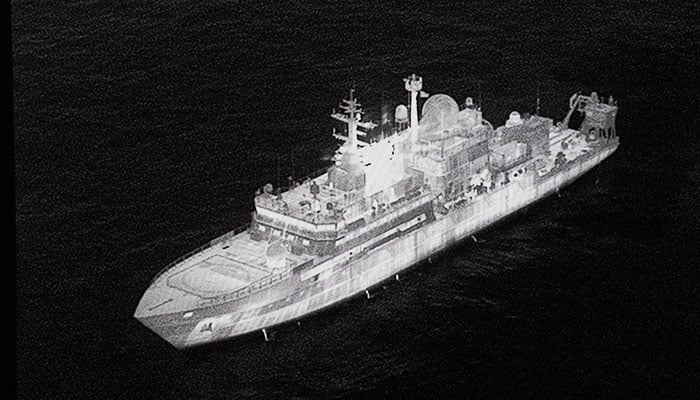
- British minister says lasers at RAF pilots “deeply dangerous”.
- John Healey says Britain poised to react to Yantar’s move.
- Russian embassy denies threat, rejects UK accusations.
LONDON: British defence minister John Healey said on Wednesday that “military options” are ready should the Russian spy ship Yantar become a threat after it directed lasers at British pilots sent to monitor it.
Britain’s Royal Navy and Royal Air Force routinely shadow potential threats to national security, and such missions to monitor Russian vessels and submarines have become more frequent since Russia invaded Ukraine in 2022.
Healey said directing lasers at RAF pilots was “deeply dangerous” and Britain was poised to react depending on the Yantar’s next move.
“We have military options ready should the Yantar change course,” Healey said.
Responding to what it described as “endless accusations”, the Russian embassy in London said: “Our country’s actions do not affect the interests of the United Kingdom and are not aimed at undermining its security.
“We are not interested in British underwater communications,” it said, urging the British side to refrain from destructive steps that exacerbate the crisis phenomena on the European continent.”
The Yantar, designed for intelligence gathering and mapping undersea cables, is currently on the edge of British waters, north of Scotland, Healey said.
He added, “This is the first time we’ve had this action from Yantar directed against the British RAF. We take it extremely seriously.”
“I have changed the navy’s rules of engagement so that we can follow more closely, monitor more closely, the activities of the Yantar when it’s in our wider waters.”
Politics
EU Diplomat Supports Pakistan’s Call for Taliban to Stop Backing TTP
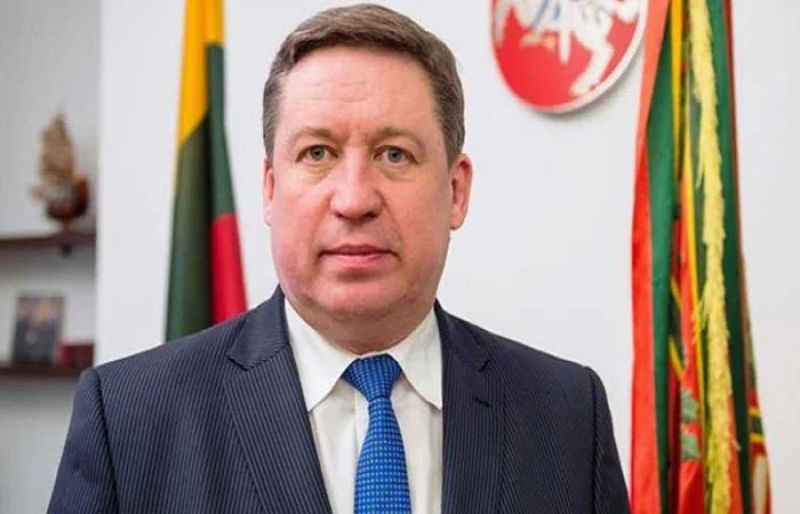
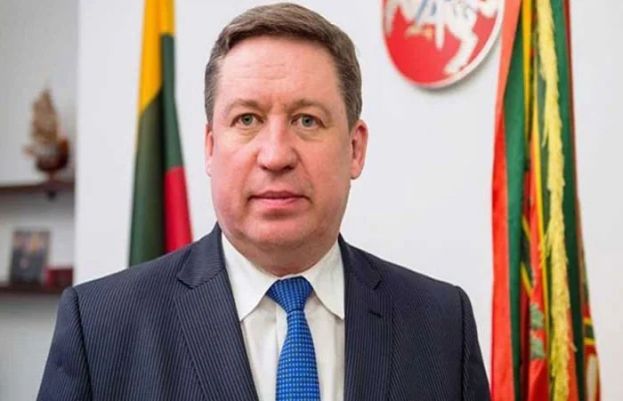
The European Union’s ambassador to Pakistan has expressed support for Islamabad’s position that militants based in Afghanistan are behind recent attacks in the country, while emphasizing that Pakistan must align its security expectations with tangible progress on human rights and democratic norms.
Newly appointed Ambassador Raimundas Karoblis said Pakistan’s call for the Taliban to prevent the Tehreek-e-Taliban Pakistan (TTP) from operating on Afghan soil is “legitimate” and linked to genuine security concerns.
“We condemn terrorism in all its forms,” he noted, adding that Pakistan’s expectations from Afghanistan regarding action against the TTP are justified.
At the same time, Karoblis stressed that the EU is urging Islamabad to maintain diplomatic channels, highlighting Turkiye’s ongoing mediation efforts between the two sides.
When asked whether the Taliban were honoring their Doha pledge not to allow Afghan soil to be used against neighboring countries, he said he lacked independent intelligence to make a judgment. “It is too early to reach a definitive conclusion,” he added.
The ambassador confirmed that a high-level Pakistan-EU Strategic Dialogue will take place in the coming weeks, led by EU foreign policy chief Kaja Kallas and Deputy Prime Minister Ishaq Dar.
The discussions will cover Afghanistan, the Russia-Ukraine war, regional security, and Pakistan’s role at the UN, while other issues such as trade, migration, and counterterrorism will be addressed in separate forums.
The dialogue comes as Pakistan seeks to maintain its preferential trade status under the GSP Plus programme, which grants duty-free access to European markets in exchange for compliance with international human rights treaties.
Enforced disappearances, long reported in Balochistan but now increasingly documented in Punjab and Sindh, will also be among the EU’s “top priorities” in its monitoring review.
The envoy noted that the EU will evaluate the performance of Pakistan’s Commission of Inquiry on Enforced Disappearances during the upcoming assessments.
When asked about Pakistan’s last two elections, both widely criticized by opposition parties, Karoblis did not label them illegitimate but acknowledged that significant issues had occurred.
“No system is perfect, but irregularities must be addressed so they are not repeated”, he said. The EU recognised the current parliament and government, he added, but concerns about electoral transparency remain on its radar.
Karoblis similarly declined to endorse or condemn recent constitutional amendments affecting judicial powers, though he noted that Brussels was listening to critics. Compliance with UN conventions, he said, was the key test the EU would apply.
Replying to a query on Imran Khan’s detention, Karoblis refused to enter the debate. “I may have personal views, but this is a matter for Pakistan’s judicial authorities”, he said. “Political pluralism is important, but it must be discussed through the rule of law”.
Karoblis said the EU and its member states have mobilised nearly one billion euros in assistance following Pakistan’s devastating 2022 floods, including an initial one million euro tranche for emergency relief.
Under the EU’s Global Gateway strategy, climate adaptation will remain a priority sector for future cooperation.
Politics
Air India lobbying to use Chinese airspace amid mounting financial woes due to Pakistan ban
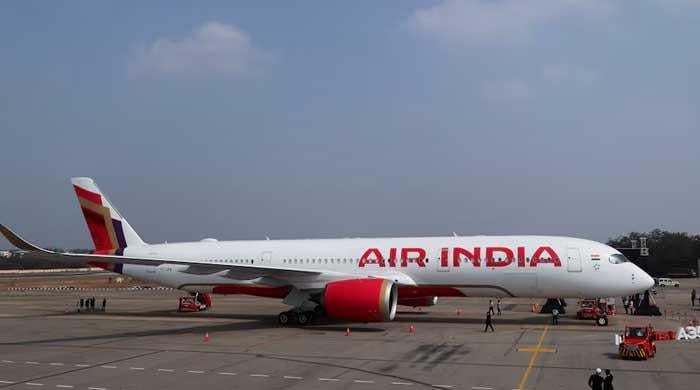
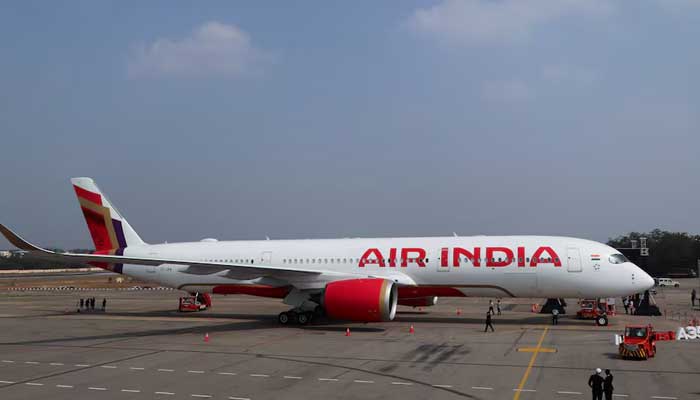
- Pakistani airspace closure costing Air India profit $455m annually.
- Passengers shifting to foreign carriers due to shorter flight time.
- India reviewing plea to diplomatically ask China for alternate route.
NEW DELHI/HONG KONG: Air India is lobbying the Indian government to convince China to let it use a sensitive military airspace zone in Xinjiang to shorten routes as the financial toll from a ban on Indian carriers flying over Pakistan mounts, a company document shows.
The unusual request comes just weeks after direct India-China flights resumed after a five-year hiatus following a Himalayan border clash between the nations.
Air India has been seeking to rebuild its reputation and international network after a London-bound Boeing Dreamliner crashed in Gujarat in June, killing 260 people and forcing it to briefly cut flights for safety checks.
But that effort is being complicated by the closure of Pakistan’s airspace to Indian carriers since their diplomatic tensions erupted in late April.
For Air India, the country’s only carrier with a major international network, fuel costs have risen by as much as 29% and journey times by up to three hours on some long-haul routes, according to the previously unreported document submitted to Indian officials in late October and reviewed by Reuters.
The Indian government is reviewing Air India’s plea to diplomatically ask China to allow an alternative routing and emergency access to airports in case of diversions at Hotan, Kashgar and Urumqi in Xinjiang, aiming to reach US, Canada and Europe faster, the document said.
“Air India’s long-haul network is under severe operational and financial strain […] Securing Hotan route will be a strategic option,” it added.
The airline, owned by Tata Group and Singapore Airlines estimated the Pakistan airspace closure’s impact on its profit before tax at $455 million annually — a significant amount given its fiscal 2024-25 loss stood at $439 million.
The Chinese foreign ministry said it was not aware of the situation and referred Reuters to the “relevant authorities”.
Air India and civil aviation authorities in India, China and Pakistan did not respond to Reuters‘ queries.
‘Nonviable routes’
The Chinese airspace Air India is seeking to access is ringed by some of the world’s highest mountains of 20,000 ft (6,100 m) or more, and is avoided by international airlines due to potential safety risks in case of a decompression incident.
More critically, it also falls within People’s Liberation Army’s Western Theatre Command, which is equipped with extensive missile, drone and air-defence assets and shares some airports with civilian aircraft, military analysts say.
The Pentagon’s December report on China’s military said the command’s responsibilities include responding to any conflict with India.
China’s military has much greater control of the country’s airspace than in most other aviation markets, restricting flight paths. Open-source intelligence tracker Damien Symon said China’s military has recently expanded an airbase at Hotan.
China’s defence ministry did not immediately respond to a request for comment.
Data from AirNav Radar shows no non-Chinese airlines departed or arrived at Hotan airport in the last 12 months.
Shukor Yusof, founder of aviation consultancy Endau Analytics, said: “Air India can try, but it’s doubtful China will accede” to access given the region’s terrain, lack of emergency airports and possibility of security issues.
Airspace globally has been constricted due to proliferating conflict zones.
US carriers have been banned from flying over Russia since the Ukraine war began in 2022 and pulled out of many US-India routes. That gave Air India a near-monopoly on non-stop flights from India.
But after the Pakistan airspace closure, Air India’s Delhi-Washington route was suspended in August. Now other routes are under review, with the direct Mumbai- and Bengaluru to San Francisco routes “becoming unviable” due to an additional three hours of travel time, including a technical stop in Kolkata, the document said.
A flight from San Francisco to Mumbai on Lufthansa via Munich is now only five minutes longer than on Air India.
“Passengers [are] shifting to foreign carriers due to shorter flight time as they have the benefit of Pakistan overflight,” the document said.
Air India estimates the requested Hotan route in China could substantially cut extra fuel requirements and flight times, help restore passenger and cargo capacity it trimmed by as much as 15% on routes like New York- and Vancouver-Delhi, and reduce losses by an estimated $1.13 million per week.
Deepening financial issues
With no signs of airspace ban easing, Air India also wants “temporary subsidy till Pakistan airspace opens”, the document said.
Air India, which has placed $70 billion of aircraft orders, is seeking help resolving legacy tax issues.
India’s government indemnified the airline against claims payable before selling it to Tata in 2022, but several notices have been received related to old tax liabilities of $725 million, raising legal and reputation risks, the document said.
A confidential government notice from March, seen by Reuters, showed tax authorities warned of “coercive steps” — which can include freezing of assets — to recover dues of $58 million in one case.
Contesting such tax demands has led to “additional cashflow burden […] despite assurances during disinvestment”, the airline said.
-

 Tech4 days ago
Tech4 days agoNew carbon capture method uses water and pressure to remove CO₂ from emissions at half current costs
-

 Politics6 days ago
Politics6 days agoBritish-Pakistani honoured for transforming UK halal meat industry
-

 Sports4 days ago
Sports4 days agoTexas A&M officer scolds South Carolina wide receiver after touchdown; department speaks out
-

 Business5 days ago
Business5 days agoThese 9 Common Money Mistakes Are Eating Your Income
-
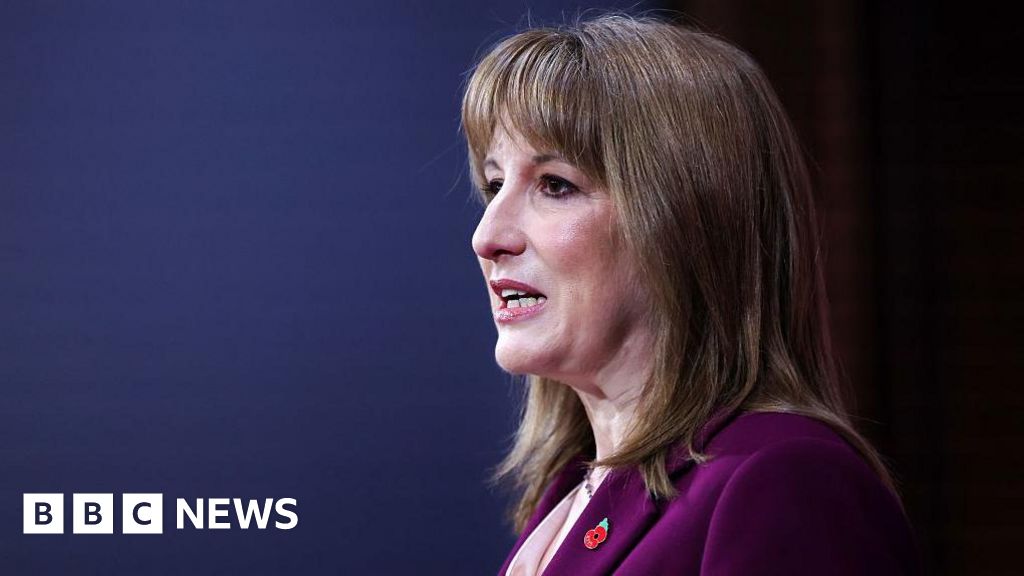
 Business5 days ago
Business5 days agoWhat’s behind Rachel Reeves’s hokey cokey on income tax rises?
-

 Fashion7 days ago
Fashion7 days agoAdidas & Patrick Mahomes expand NIL programme with Texas Tech athletes
-

 Sports5 days ago
Sports5 days agoApple scrapping MLS Season Pass service in ’26
-

 Tech6 days ago
Tech6 days ago$25 Off Exclusive Blue Apron Coupon for November 2025






